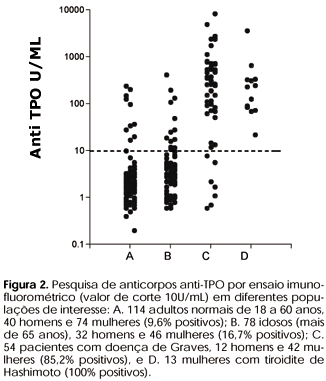Since the first publication, more than 40 years ago, laboratory tests for the presence of antibodies (Ab) to thyroid antigens (Ag) have played a pivotal position in the diagnosis of thyroid diseases. Thyroid is a common target for autoimmune diseases, hence the interest in the definition of the thyroid Ag that could be involved in the process. The first Ag to be recognized was thyroglobulin, followed by the "microsomal Ag", later identified with thyroid peroxidase, the TSH receptor and, more recently, other Ag like the sodium/iodide symporter (NIS). The methodologies employed evolved from the initial hemaglutination assays, to the present use of recombinant Ag, alternative labels and transfected cells. Today the clinical uses of a test to detect the presence of Ab against thyroid Ag are very well defined. The most useful test is the detection of anti-peroxidase Ab, the test with greatest sensitivity and specificity for the presence of autoimmune thyroid diseases. The anti-thyroglobulin test is mandatory as a complement for the measurement of thyroglobulin in the follow-up of patients with differentiated thyroid cancers. The anti-TSH receptor test has its main use in the definition of the presence of Graves’ disease. Tests for the presence of Ab against other thyroid Ag have no clear indication at the moment. The continuous methodological developments will certainly increase the utility of tests for anti-thyroid Ab.
Anti-thyroid antibodies; Anti-thyroid peroxidase antibodies; Anti-thyroglobulin antibodies; Anti-TSH receptor antibodies



